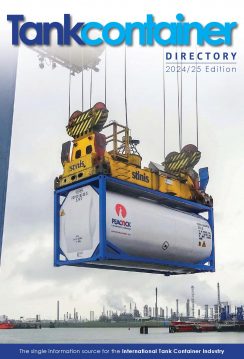The 13th edition of the GPCA Supply Chain Conference concluded at the Hilton Dubai Al Habtoor City today
Dubai, United Arab Emirates, 19 May 2022 – If the last two years have proven anything at all, it is that the supply chain of the future would need to be more sustainable and resilient in order to prepare for and mitigate future disruptions, agreed speakers at the 13th Gulf Petrochemicals and Chemicals Association (GPCA) Supply Chain Conference, held from 17-19 May at the Hilton Dubai Al Habtoor City, Dubai, UAE.
The onset of the COVID-19 pandemic at the start of 2020, the threat of climate change since the beginning of the century and now the Russia-Ukraine conflict have sent shockwaves across global supply chains and threatened to transform existing logistics models, compelling business leaders to take heed and adopt new ways of thinking. This was the main takeaway from this week’s GPCA event.
“The crisis brought on by the pandemic forced companies to shift their focus to innovation and restructuring efforts, to ensure business continuity by building resilience and agility,” said Saleh Al-Suwaiti, CEO, FAHSS-TUV, and Chairman, GPCA Supply Chain Committee, in his welcome address on day one. Today supply chain decarbonization is at the forefront of conversations, as governments and businesses alike pledge their support towards carbon neutrality, he added.
Al-Suwaiti set the tone for the discussion which saw 29 leading industry experts share their insights as part of the event’s theme “Future-proofing supply chains: The time is now”. During the event’s first of its kind executive panel, Dr. Bashar Al Malik, CEO, Saudi Railway Company (SAR), and Dr. Faisal Al-Faqeer, CEO, Sadara Chemical Company, pointed to the importance of ensuring supply chain reliability and putting a robust, multi-modal transportation system in place. The GCC Rail is expected to not only improve the supply chain system as a whole, but can do so in a more efficient and sustainable way, reducing emissions substantially, they added
In the plenary address on day one, Esam Khoori, Executive Director – Container Terminals, DP World UAE, told the audience: “As we transition forward from two years of disruptions, we find that knowledge capital is what will drive successful businesses.” Calling for a more connected, collaborative and responsible sector, he added: “The petrochemical industry stands much to gain through improved, sector-wide collaboration,”.
Presentations on day two continued to put emphasis on the need for sustainability across chemical supply chains. In his welcome address, Aslam Moola, Commercial and Business Development Director, Vopak Middle East, and Vice-Chairman, GPCA Supply Chain Committee, praised new energy storage and transport solutions, such as the GCC Rail, for making transformational changes to the supply chain and logistics in the region.
Mutlaq Bin Saad Al-Mutlaq, Director, GCC Custom Union, delivered the keynote address on the last day of the conference. He began by outlining the opportunities to facilitate intra-GCC trade within the framework of the GCC Customs Union. He also shared the latest updates about the GCC’s work in this regard and concluded by highlighting the socio-economic benefits of this important initiative for members in the region.
Dr. Abdulwahab Al Sadoun, Secretary General GPCA, commented: “Chemical supply chains are operating in an increasingly complex landscape disrupted by global forces beyond the chemical industry’s control. From geopolitical tensions to the impact of the still ongoing COVID-19 pandemic, rising global trade protectionism and nearshoring by numerous countries across the world, supply chain leaders are facing a challenging task – to plan and prepare for a future that may be radically different from the current reality and ever more difficult to predict. As a result, staying proactive and agile will be some of the key factors that will help insulate companies from future risks.
“On the other hand, key imperatives such as customer proximity, adopting supply chain digitalization, acting on sustainability and truly understanding the impact from the Environment, Social and Governance (ESG) agenda means that companies cannot wait any longer for these trends to arrive. They are right here on their doorstep and already transforming the chemical industry’s supply chain. To stay competitive, chemical industry leaders must capitalize on the opportunities ahead to grow their agility, collaborate with their customers and partners, and drive down their impact on the environment with the right investment and technology. Lastly, they must focus on developing their talent and equipping them with the skills they need to solve challenges they are yet to face.”
May 24, 2022
Dubai, United Arab Emirates, 19 May 2022 – If the last two years have proven anything at all, it is that the supply chain of the future would need to be more sustainable and resilient in order to prepare for and mitigate future disruptions, agreed speakers at the 13th Gulf Petrochemicals and Chemicals Association (GPCA) Supply Chain Conference, held from 17-19 May at the Hilton Dubai Al Habtoor City, Dubai, UAE.
The onset of the COVID-19 pandemic at the start of 2020, the threat of climate change since the beginning of the century and now the Russia-Ukraine conflict have sent shockwaves across global supply chains and threatened to transform existing logistics models, compelling business leaders to take heed and adopt new ways of thinking. This was the main takeaway from this week’s GPCA event.
“The crisis brought on by the pandemic forced companies to shift their focus to innovation and restructuring efforts, to ensure business continuity by building resilience and agility,” said Saleh Al-Suwaiti, CEO, FAHSS-TUV, and Chairman, GPCA Supply Chain Committee, in his welcome address on day one. Today supply chain decarbonization is at the forefront of conversations, as governments and businesses alike pledge their support towards carbon neutrality, he added.
Al-Suwaiti set the tone for the discussion which saw 29 leading industry experts share their insights as part of the event’s theme “Future-proofing supply chains: The time is now”. During the event’s first of its kind executive panel, Dr. Bashar Al Malik, CEO, Saudi Railway Company (SAR), and Dr. Faisal Al-Faqeer, CEO, Sadara Chemical Company, pointed to the importance of ensuring supply chain reliability and putting a robust, multi-modal transportation system in place. The GCC Rail is expected to not only improve the supply chain system as a whole, but can do so in a more efficient and sustainable way, reducing emissions substantially, they added
In the plenary address on day one, Esam Khoori, Executive Director – Container Terminals, DP World UAE, told the audience: “As we transition forward from two years of disruptions, we find that knowledge capital is what will drive successful businesses.” Calling for a more connected, collaborative and responsible sector, he added: “The petrochemical industry stands much to gain through improved, sector-wide collaboration,”.
Presentations on day two continued to put emphasis on the need for sustainability across chemical supply chains. In his welcome address, Aslam Moola, Commercial and Business Development Director, Vopak Middle East, and Vice-Chairman, GPCA Supply Chain Committee, praised new energy storage and transport solutions, such as the GCC Rail, for making transformational changes to the supply chain and logistics in the region.
Mutlaq Bin Saad Al-Mutlaq, Director, GCC Custom Union, delivered the keynote address on the last day of the conference. He began by outlining the opportunities to facilitate intra-GCC trade within the framework of the GCC Customs Union. He also shared the latest updates about the GCC’s work in this regard and concluded by highlighting the socio-economic benefits of this important initiative for members in the region.
Dr. Abdulwahab Al Sadoun, Secretary General GPCA, commented: “Chemical supply chains are operating in an increasingly complex landscape disrupted by global forces beyond the chemical industry’s control. From geopolitical tensions to the impact of the still ongoing COVID-19 pandemic, rising global trade protectionism and nearshoring by numerous countries across the world, supply chain leaders are facing a challenging task – to plan and prepare for a future that may be radically different from the current reality and ever more difficult to predict. As a result, staying proactive and agile will be some of the key factors that will help insulate companies from future risks.
“On the other hand, key imperatives such as customer proximity, adopting supply chain digitalization, acting on sustainability and truly understanding the impact from the Environment, Social and Governance (ESG) agenda means that companies cannot wait any longer for these trends to arrive. They are right here on their doorstep and already transforming the chemical industry’s supply chain. To stay competitive, chemical industry leaders must capitalize on the opportunities ahead to grow their agility, collaborate with their customers and partners, and drive down their impact on the environment with the right investment and technology. Lastly, they must focus on developing their talent and equipping them with the skills they need to solve challenges they are yet to face.”
May 24, 2022
You currently do not have access to this article, please login or register to read more.
Login to read more






